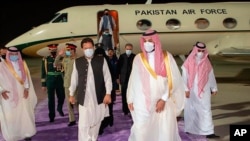Pakistan Prime Minister Imran Khan began on Friday a three-day visit to Saudi Arabia to boost historically close relations between the two longtime allied nations.
The visit was taking place at the invitation of Saudi Crown Prince Mohammed bin Salman, who personally received Khan and his high-powered delegation at the Jeddah airport.
Pakistani officials said that the crown prince, often referred to by his initials, MBS, and Khan later held delegation-level talks that Pakistan’s military chief General Qamar Javed Bajwa joined. Bajwa was already in Saudi Arabia to discuss bilateral defense cooperation.
Khan’s media team said he and the crown prince later oversaw the signing of several agreements and memorandums of understanding between Pakistan and Saudi Arabia to enhance bilateral cooperation in areas such as the economy, trade, energy investment and the media.
The two sides also sealed agreements to fight climate change and drug smuggling and facilitate recruitment of the Pakistani workforce, officials said.
Tahir Mehmood Ashrafi, Khan’s special envoy to the Middle East and a top Pakistani religious scholar, told reporters on the eve of the visit that the leaders of the two Muslim nations would also discuss Islamophobia, Palestine, and Pakistan’s long-running territorial dispute with rival India over Kashmir.
Pakistan has traditionally relied on Saudi financial assistance to support its struggling economy. Riyadh gave Islamabad a $3 billion loan and a $3.2 billion oil credit facility in late 2018.
Last year, the Pakistani government publicly criticized the Organization of Islamic Cooperation (OIC), a group of 57 Muslim countries led by Saudi Arabia, for its inaction over alleged human rights violations by New Delhi in the India-ruled part of Kashmir.
The rare criticism prompted the Saudi government to withdraw the oil credit facility and push Pakistan to repay the loan.
Pakistan’s bilateral annual trade with Saudi Arabia stands at around $4 billion, mostly consisting of Saudi oil imports. More than 2 million Pakistanis work in Saudi Arabia, sending around $6 billion annually in remittances to their cash-strapped South Asian nation.
Khan’s office said the prime minister will also meet the secretary-general of the OIC, Yousef Al-Othaimeen, during the visit and will also interact with the Pakistani diaspora in Jeddah.
Syed Muhammad Ali, director of nuclear and strategic affairs at the Centre for Aerospace & Security Studies, a think tank in Islamabad, said the resumption of the Saudi financial assistance would be a key outcome for Pakistan.
“Any Saudi consideration of delayed payment for Pakistan's oil import will help reduce pressure on Khan’s government to prepare the upcoming budget faced with difficulties due to COVID-19 and rising inflation,” Ali said.
Michael Kugelman, deputy Asia program director at Washington’s Wilson Center think tank, said the presence of the Pakistani military chief in Khan’s meetings with the Saudi leadership “attests to the importance of the visit.”
“It’s a significant visit as it’s meant to mark the final step of a reset set in motion after a rare spat last year,” Kugelman said. “The relationship isn’t as stable as it used to be, but there’s still plenty of shared goals to keep it on a level plain.”
Pakistan has maintained close defense ties with Saudi Arabia and has deployed around 2,000 troops to the kingdom to undertake security and training missions there.
Pakistan’s retired military chief General Raheel Sharif is currently the head of a 41-nation Saudi-formed Islamic Military Alliance to fight terrorism.




